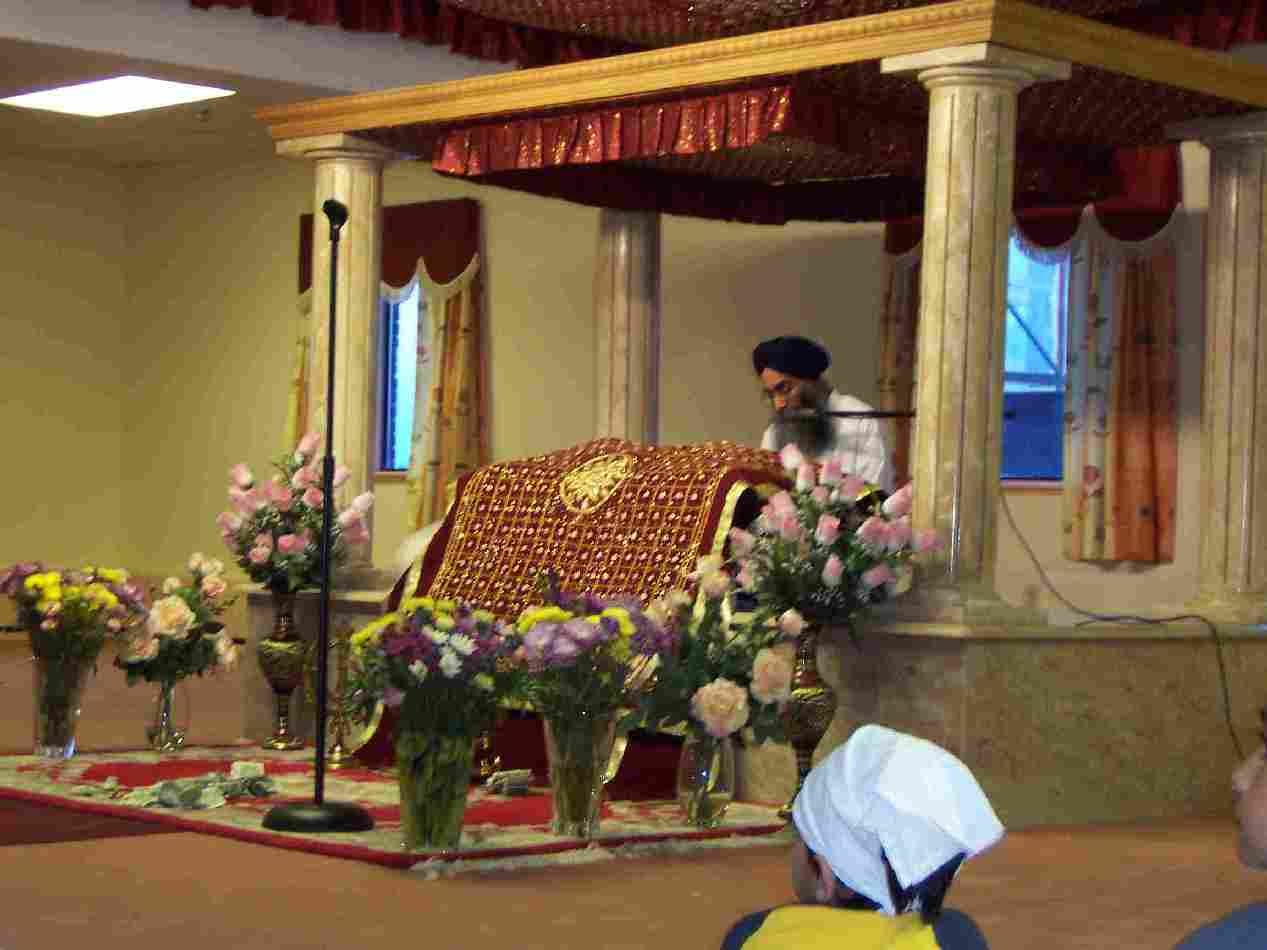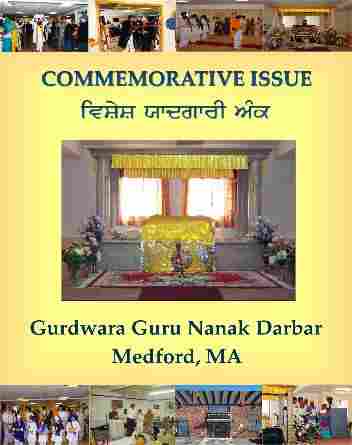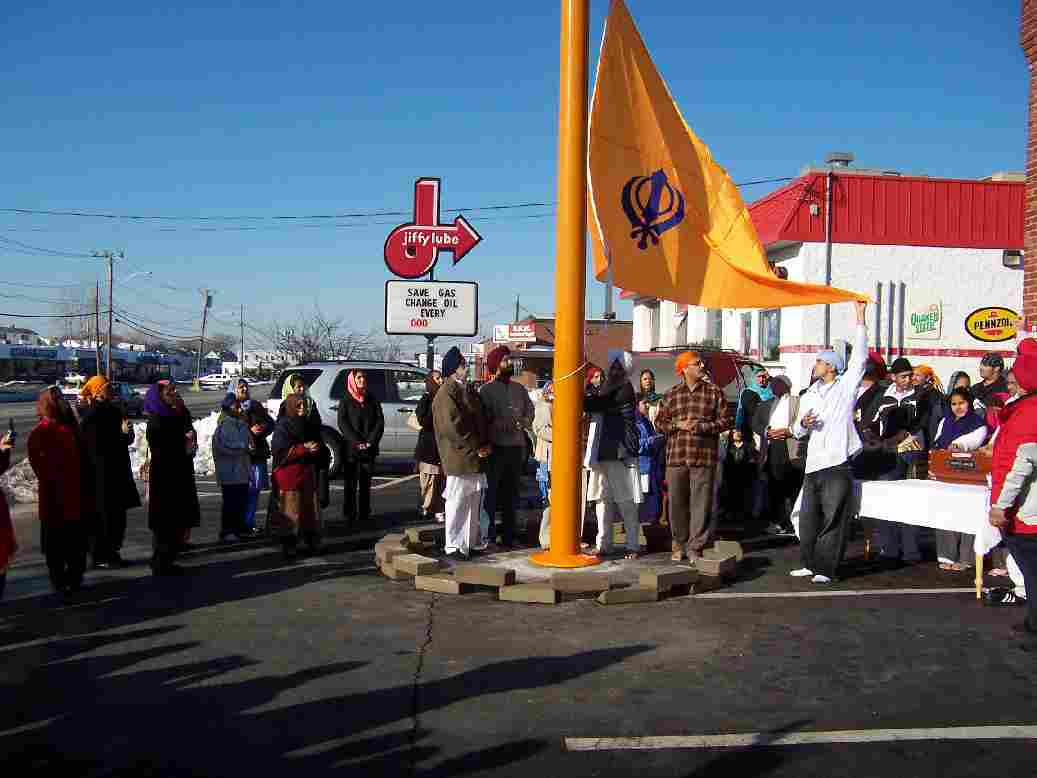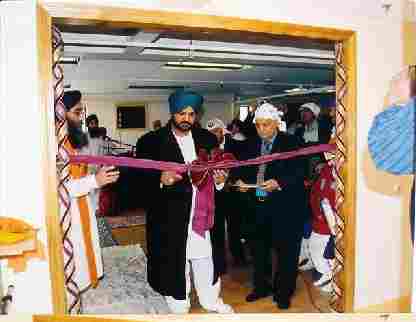Contribute
| Lokvani Talks To Gurinder Singh Saini Of Gurudwara Guru Nanak Darbar |
Nirmala Garimella
02/08/2006
A pressing need for a place of worship and communal service to cater for the needs of the community of Sikhs in The Gurdwara began as a prayer service that was conducted in the houses of Sikhs who were members of the community. About six months later, the community rented a premises at 62 Summer Street, The community now comprises of some 40 families and is growing. The Gurdwara's management comprises 7 Directors headed by Sardar Bachittar Singh Sodhi as Chairman. The Management Committee of the Gurdwara comprises of Sardar Jaspal Singh Pabla as President, Sardar Gurminderjit Singh as Treasurer, Sardar Harbhajan Singh as Vice Treasurer, Sardar Gurinder Singh Saini as Secretary, and Jarnail Singh Pabla and Avtar Basuta as Executive members. Lokvani talked to Gurinder Singh Saini, Secretary about the various facets of Sikhism and the activities of the Darbar. Q. When did the new Gurudwara take shape ? In May 2003 the Sangat purchased a building in the commercial hub of The current thrust of the Management Committee, headed by Sardar Jaspal Singh Pabla as President, is the maximum utilization of these premises. All activities are geared towards educating and training the children and youth. Punjabi classes have been set up with well equipped with audio-visual teaching aids to make teaching effective.Additionally, the management committee is in the process of setting up and equipping the Khalsa Library for the benefit of the children. Q. What are the most important tenets of Sikhism? The most important tenets of Sikhism are: 1] Honesty and hard work (Kirat karna): A Sikh shall earn through honest means and work hard to achieve livelihood. A Sikh shall not indulge in begging and dishonest means. 2] Sharing with others, (Vand Chhakna) is a social responsibility of a Sikh towards his neighbors and community at large. The individual is expected to help others in need irrespective of the caste and creed, through charity. 3] Community service (Seva) is also an integral part of any Gurudwara or 4] The soul goes through in numeral cycles of births and deaths before it attains the human form. The goal of a Sikh life is to lead a blissful existence so that one may merge with God. Sikhs shall remember God at all times and practice virtuous and truthful living while maintaining a balance between their spiritual and worldly obligations. 5] The true path to achieve salvation and ultimate merger with God 6] Sikhism denounces blind rituals such as fasting, visiting places of pilgrimage, superstitions, worship of the dead, idol worship etc. 7] Sikhism preaches oneness of God and equality of humanity. It stresses equality of the soul without the discrimination of gender. Women have equal status to that of men in Sikhism. Women can take part in any religious activity and perform any Sikh ceremony or lead the congregation in prayer. 8] Sikhism rejects female infanticides, allows widow remarriage, and rejects purdah (veil). Dowry and divorce are not permitted. 9] Sikhism encourages normal family life (Grasth). Sikhism stresses that renunciation of the world or practicing celibacy does not guarantee salvation. Devout Sikh must live a normal life and shall honor all of his worldly obligations yet keep his mind pure. He must be soldier, a scholar, a saint. Source: Adapted from the article written by Satwant Mangat. Q] Would you elaborate on the Diwans at the Gurudwara and their significance? Diwaan is held at the Gurudwara Sahib every Sunday. It starts with the reading of the Five Banees (prayers) which begins at A devout Sikh (a learner) is expected to contribute 10% of his daily routine in remembrance and complete devotion to God. In Sikhism attending Satsang (congregation of devotes) has a special significance in achieving the ultimate goals of merging with God. Ideally these congregations should be held at the Gurudwara daily in the morning as well in the evening. But, considering the modern day pre-occupations most of the people get a free time only on Sundays, so, these diwaans are attended by most of the people on weekends. Diwaans are significant in various aspects: Spiritual: In the diwaans every human soul come and joins the other congregants with one goal i.e. to thank and pray to God. At home, personal worries and other problems distract the mind of an individual whereas Diwaans provide a unique spiritual atmosphere which is helpful in quenching spiritual thirst. Community service: It provides an environment where people can get together without discrimination of any caste, color or social status. Congregants voluntarily manage and conduct the affairs of the Gurudwara which includes the common kitchen. Here devotees contributes through preparation and then provide food to all devotees, pilgrims and visitors. Q. Tell us about the last big event the Gurpurab ? The Sikh Religion has many Gurpurabs, some are local and others are global. The birth anniversary of Guru Nanak Dev Ji (first guru) and Guru Gobind Singh Ji (tenth guru) is celebrated globally as is the martyrdom of Guru Arjun Dev Ji (fifth guru and the first martyr of Sikh religion) and Guru Teg Bahadur Ji (ninth guru). Some examples of local Gurpurabs are Maghi (A tribute to the Chali Mukte is paid at the city of Mukatsar in Punjab, site of one of the last battles Guru Gobind Singh Ji fought), Sirhind Johrmela (This Gurpurab is held in the memory of younger two sons of Guru Gobind Singh Ji Baba Jorawar Singh and Baba Fathe Singh, both of them were martyred at Sirhind), etc. The birth anniversary of Guru Gobind Singh Ji was celebrated in the month of January. On this occasion, Special Kirtan diwaans was held on 5th January from Continuing in the same vein, Sri Akhand Path, a continuous or non-stop recital of Sri Guru Granth Sahib was conducted which started at 5:00 am on 6th January and concluded after continuous recitation for 52 hours on 8 th January. Thirteen devout volunteers came forward to fulfill this sacred service. This was unique transformation for the Sangat of Gurudwara Guru Nanak Darbar, because normally in the Gurudwaras, the Akhand Paths are conducted by professional pathees but here at Gurudwara Sahib this ceremony was conducted by group of immensely dedicated volunteers. Each volunteer was recited Sri Guru Granth Sahib for two hours according to their respective duties. During this three day celebration, langar was served through all day to the Sangat (devotees). Special evening diwaans in Bigger Diwaan hall were held on 6 Th and 7th January from Q] The Nishan Sahib is obviously of great importance? What does it signify? It signifies sovereignty and independence of the faith. It is also a symbol for the Sikh institution. It represents both major tenets of the religion - Sant (saintliness) and Sipahi (sovereignty). The saffron color and the symbols on the flag - the Chakar and the Kirpan signify the former. The fact that it flies high and in every Sikh temple signifies the latter. Q] Besides prayers what are the other activities of the Gurudwara? Kirtan/music classes, harmonium, tabla teaching. Also gurbani classes and Punjabi classes. A limited amount of counseling for families in need. Q] How do children growing up here respond to their religion? It is a challenge. We are a small minority. Often a Sikh child is the only one in the entire school. In some cases, the family is the only one in the entire neighborhood. Our children rely a lot on the family to teach them Sikh values. The Gurudwara held in the sense of allowing us to come together and to pool our limited resources Q] Can non Sikhs participate in its activities? Do you have a protocol to follow? It can be a learning process for any non-Sikh. After all, we are a minority and we welcome any interest in our faith. As for protocol - all they need to do is to remove their shoes and cover their heads. We sit on the floor for prayer as well as meals - so appropriate attire may help. Our membership is open to all Sikh families in greater For more information visit http://www.bostongurudwara.com/
The Gurdwara was the result of pooling of talent and resources amongst members of the community. The history of the Gurdwara is a story of sorts that parallels the development of the Sikh Community in
The Gurudwara meets on Sundays for its main functions.
The Gurudwara conducts weekly Kirtan (Harmonium, Tabla) and Gurbani Recital classes. These classes run on week days from
does not require renunciation of the world or celibacy, rather it
require the individual to live a life of householder, earning an honest livelihood and renouncing mortal temptations and sins.
Q] What would be the population of the Sikh Community in
I can only guess from the size of our temple attendance. I'd say some forty families come to the Gurudwara from the greater
Our temple has a role for everybody in the community - there is involvement of people progressively down the line from directors to members to non members and even to non sikhs. Directors and office bearers of course do the usual tasks of administrative and managerial functions including the daily operations. Members are those who have signed up, pay monthly subscription dues, have rights (such as to be elected, to elect and to vote) and have obligations towards the upkeep and maintenance of the temple. Non members are allowed to attend and participate in all religious, social and cultural activities. If they wish to conduct prayers we make all the necessary arrangements for them. We understand that being the only Sikh temple in the
You may also access this article through our web-site http://www.lokvani.com/




